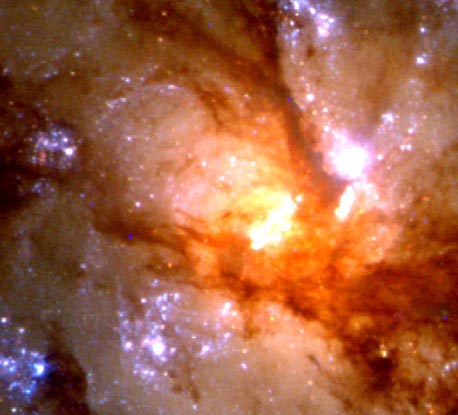Explanation: It's a clash of the titans. Two galaxies are squaring off in Corvus and here are the latest pictures. When two galaxies collide, however, the stars that compose them usually do not. This is because galaxies are mostly empty space and, however bright, stars only take up only a small amount of that space. But during the slow, hundred million year collision, one galaxy can rip the other apart gravitationally, and dust and gas common to both galaxies does collide. In the above wreckage, dark dust pillars mark massive molecular clouds, which are being compressed during the galactic encounter, causing the rapid birth of millions of stars.
1999 2000 2001 2002 2003 2004 2005 2006 2007 2008 2009 2010 2011 2012 2013 2014 2015 2016 2017 2018 2019 2020 2021 2022 2023 2024 2025 |
Yanvar' Fevral' Mart Aprel' Mai Iyun' Iyul' Avgust Sentyabr' Oktyabr' Noyabr' Dekabr' |
NASA Web Site Statements, Warnings, and Disclaimers
NASA Official: Jay Norris. Specific rights apply.
A service of: LHEA at NASA / GSFC
& Michigan Tech. U.
|
Publikacii s klyuchevymi slovami:
colliding galaxies - vzaimodeistvuyushie galaktiki - vspyshka zvezdoobrazovaniya - Molekulyarnye oblaka
Publikacii so slovami: colliding galaxies - vzaimodeistvuyushie galaktiki - vspyshka zvezdoobrazovaniya - Molekulyarnye oblaka | |
Sm. takzhe:
Vse publikacii na tu zhe temu >> | |
